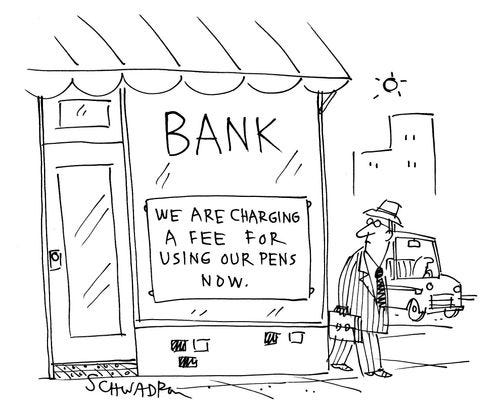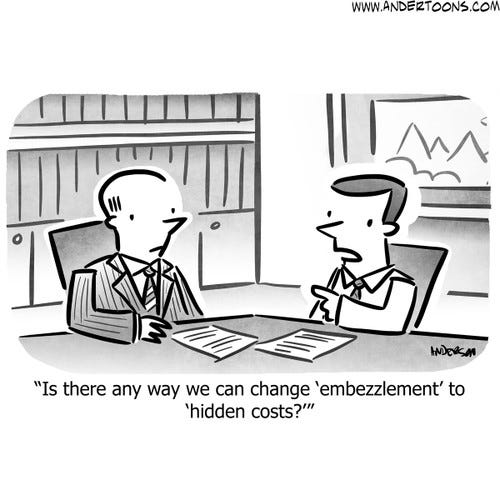Joe is hosting a poker game in our basement tonight. So instead of yelling down the steps with a back and forth for our column, I said I would write one on my own.
Or rewrite, as the case may be. Writers are notorious plagiarists of their own work. A version of this column was in the Ames Tribune. Some of you might remember when the Ames Tribune was a newspaper with opinion columns and letters to the editor.
This particular column (a version originally published in 2016) stands up over time because of something Joe Biden proposed only last month: a rule would that ban businesses from charging hidden fees so consumers don’t know how much they are paying or exactly what they are getting for their money. Of course, lawsuits by corporations will ensue.
The Vault Story
On a car trip to Toledo, Ohio a few years ago, Joe and I decided to stop for the night at a chain motel right off the highway. The motel was clean and charmless. No surprises. The bill, charged to our credit card, was placed under the door some time early the next morning.
A motel bill has add-ons. There is often more than one tax, a surcharge to cover amenities, internet use, parking or pay-per-view.
At the bottom of this particular bill was fine print: Vault Fee: $1.50.
“What’s a vault fee?” I asked as we packed up.
Joe shrugged. “Is there a vault in the room?”
Indeed, in the motel closet, was a small safe with instructions for use. Since we had not brought diamonds or passports on a trip to see family in Toledo, we had not used the vault.
My husband, who does not seem to mind the small injustices of everyday life in the same way that I do, was already heading to the elevator with our suitcases.
“I don’t see why we should have to pay a fee for something we didn’t use,” I said when we got to the lobby.
He noticed a line of people at the desk. “Fern, it’s a dollar and fifty cents,” he said. “Let’s just get on the road.” Then he sighed and went on ahead to load up the car.
I waited in line and showed our bill to the young woman behind the desk. “What exactly is a vault fee?” I asked.
Helpfully, she told me that it was for the use of the vault.
“We didn’t use the vault,” I told her. I wondered if a security camera affirmed this.
“Oh, no problem,” she said cheerfully. “I’ll just take it off your bill.”
Well, I started to explain, there really was a problem, though not one of her own making, but in essence the motel was scamming the guests because unless a guest looked carefully at the bill and then made the effort to take the vault fee OFF the bill, the motel actually made a dollar and a half of profit to which the motel was not entitled. This was an unseemly business practice and was just not right.
I said all of the above in a matter-of-fact way, indicating my understanding that she herself was in no way responsible.
She looked at me blankly, repeating: “I’ll make sure to take the fee off your bill, Ma’am.”
On the road, I imagined the financial officers at Motel Chain Whatever making this decision while sitting at a big desk.
There’s a meeting. A bunch of guys (ok, women, too) who used to be business majors talking about how to increase revenue. And someone comes up with the idea that putting a safe in every motel closet in every motel across the country and charging a fee for this “amenity” will generate a considerable amount of money. A small fee, so the guest will not object. Nor possibly even notice. Maybe a dollar or so, an add-on in thousands of rooms with motels in hundreds of cities. Do the math.
Around the big desk everyone agrees that this is a splendid idea.
When we got home from Toledo, I intended to write a letter of complaint to the president of the motel chain, but I never did. Good intentions. Today I cannot even remember what motel chain it was.
The reason that I am writing about it now is because over the years, I’ve come to think of this as “The Vault story.”
Whenever there is corporate corruption or political malfeasance or even something more sinister, there is not just one person of questionable moral authority, but a group of people who knowingly agreed to do something for whatever reason (to save money, to make money, to win an election) that is just flat-out wrong.
And so we have added “resort” fees to places that are already resorts.
And we have service charges on bills that are as complicated to read as Finnegan’s Wake.
And we have extraneous charges from banks and mortgage lenders that confuse even those with degrees in business.
And we have ticket add-ons to a price that is already extravagant for concert fans.
And we have drug companies permitted to raise the price of a medication by astronomical proportions for drugs so rarely used that the company thinks no one will call them on it.
If I had written a letter to the corporate head of Motel Chain Whatever, I would have urged him or her to do the right thing and get rid of the Vault Fee. But I would be just a complaining customer.
In any group, whistle-blowers are often vilified (and fired) before they are revered. But it shouldn’t take so long for someone in house or in the party or on the team to speak out before damage is done.
Doing the right thing over-rides corporate profits, team solidarity or party loyalty. Doing the right thing demands examination of our deepest, moral selves. Sometimes the power can be from a small, lone voice at the big desk.








I complain every time I see charges like this. In most cases the charge is taken off, but it is a dishonest way of doing business. The "little" charges on phone bills now are ridiculous. And some of them can't be explained by the employees when I complain.
Yes!